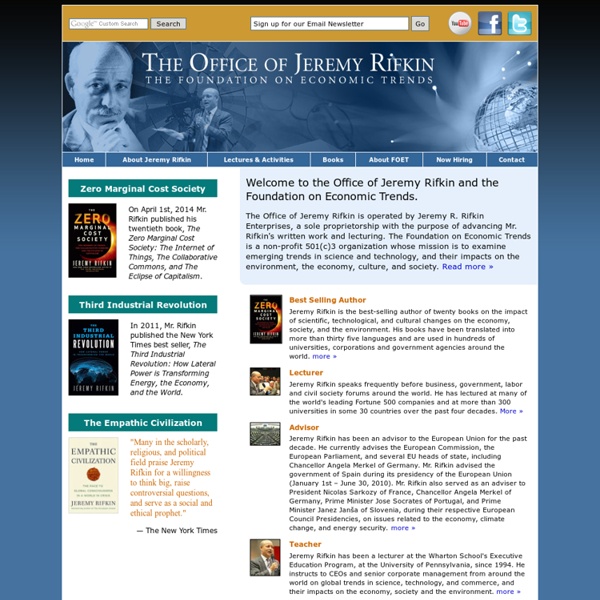



Celebration of the 40th anniversary of the launching of Limits to Growth in Washington, DC On Thursday March 1st 2012, to celebrate the 40th anniversary of the launching of Limits to Growth, the first report to the Club of Rome, a symposium entitled “Perspectives on Limits to Growth: Challenges to Building a Sustainable Planet” was hosted in Washington, DC by the Club of Rome and the Smithsonian Institution’s Consortium for Understanding and Sustaining a Biodiverse Planet. The joint symposium of Club of Rome and the Smithsonian Institution celebrated the 40th anniversary of the launching of Limits to Growth, the first report of the Club of Rome published in 1972. This book, which sold over ten million copies in various languages, was one of the earliest scholarly works to recognize that the world was fast approaching its sustainable limits.
Jeremy Rifkin Jeremy Rifkin (born January 26, 1945) is an economic and social theorist, writer, public speaker, political advisor and activist. Rifkin is president of the Foundation on Economic Trends and the bestselling author of nineteen books on the impact of scientific and technological changes on the economy, the workforce, society, and the environment. His books have been translated into more than thirty five languages and are used in hundreds of universities, corporations and government agencies around the world. His most recent books include the New York Times Best Seller The Third Industrial Revolution (2011), The Empathic Civilization (2010), The European Dream (2004), The Hydrogen Economy (2002), The Age of Access (2000), The Biotech Century (1998), and The End of Work (1995).
Rainbow Gathering International hippie camping event Rainbow Gatherings are temporary, loosely knit communities of people, who congregate annually in remote forests around the world for one or more weeks at a time[1] with the stated intention of living a shared ideology of peace, harmony, freedom, and respect.[3] In the original invitation, spread throughout the United States in 1971, the "Rainbow Family Tribe" referred to themselves as "brothers & sisters, children of God", "Families of life on Earth", "Friends of Nature & of all People" and "Children of Humankind".[4]. All races, nations, politicians, etc. were invited in the desire that there could be peace among all people. The goal was to create what they believed was a more satisfying culture — free from consumerism, capitalism, and mass media — one that would be nonhierarchical, that would further world peace, and serve as a model for reforms to mainstream society. Background[edit] History[edit]
Metadesigners Open Network An early prototype of The Lovers' Clock artwork See this set of notes on finding a more synergistic form of temporality Dennis Meadows Dennis L. Meadows (born June 7, 1942) is an American scientist and Emeritus Professor of Systems Management, and former director of the Institute for Policy and Social Science Research at the University of New Hampshire.[1] He is President of the Laboratory for Interactive Learning and widely known as the co-author of The Limits to Growth. Biography[edit] Dennis Meadows received a BA from Carleton College, a Ph.D. in Management from the MIT Sloan School of Management, and holds four honorary doctorates. He started working at the faculty of the Massachusetts Institute of Technology in the late 1960s.[citation needed] From 1970 to 1972 at MIT he was director of the "Club of Rome Project on the Predicament of Mankind".[2] Further on Meadows has been a tenured professor in faculties of management, engineering, and social sciences.
Occupy Wall Street: An interview with Kalle Lasn, the man behind it all - BlogPost An ad Adbusters ran in July. (Image via Adbusters) Back in July, an idea by Kalle Lasn and his colleagues at Adbusters, a nonprofit magazine run by social activists, had started to come together. For months, Lasn had noticed among his 120,000 readers an unresolved anger that wasn’t finding expression. He observed that young people were starting to say they worried about having a “black hole future” ahead of them, and it suddenly felt, he said, “like a Tahrir moment in America was eminently possible.”
Resilient Cities - ICLEI: Home 15 April 2014 Together with eight international organizations ICLEI joined a new urban resilience partnership which was announced at the World Urban Forum in Medellin, Colombia last week. “There has been a tremendous outpouring of support for urban resilience in recent years. This new collaboration represents a consolidation of those efforts as we prepare for an explosion of urbanization in the 21st century” said Margareta Wahlström, UNISDR Chief and Co-patron of the Resilient Cities congress 2012 and 2013. The partnership has been established by UN-Habitat, UNISDR, The World Bank Group, the Global Facility for Disaster Reduction and Recovery (GFDRR); the Inter-American Development Bank (IDB); the Rockefeller Foundation; the 100 Resilient Cities Centennial Challenge Programme, pioneered by the Rockefeller Foundation; the C40 Cities Climate Leadership Group; and ICLEI - Local Governments for Sustainability.
Statistics and Monitoring - Millennium Development Goals (MDG) monitoring Overview In September 2000, 189 countries signed the United Nations Millennium Declaration [A/RES/55/2], committing themselves to eradicating extreme poverty in all its forms by 2015. To help track progress toward these commitments, a set of time-bound and quantified goals and targets, called the Millennium Development Goals, were developed for combating poverty in its many dimensions - including reducing income poverty, hunger, disease, environmental degradation and gender discrimination. About the Millennium Development Goals